The temporary import of a car into the Russian Federation has expired. Violation of temporary import of cars into the Russian Federation. Who can implement
EAEU TC Article 224. Completion, suspension and termination of the customs procedure for temporary import (admission)
1. Before the expiration of the customs procedure for temporary import (admission), established by the customs authority, this customs procedure ends:
1) placing temporarily imported goods under the customs procedure of re-export, including in accordance with paragraph 7 of Article 276 of this Code;
2) recognition by customs authorities in accordance with the legislation of the Member States on customs regulation of the fact of destruction and (or) irretrievable loss of temporarily imported goods due to an accident or force majeure or the fact of irretrievable loss of these goods as a result of natural loss under normal conditions of transportation (shipment) and (or) storage;
3) the occurrence of circumstances determined by the Commission and (or) the legislation of the Member States on customs regulation, before the occurrence of which the goods are under customs control.
2. Before the expiration of the customs procedure for temporary import (admission), established by the customs authority, this customs procedure can be completed:
1) placing temporarily imported goods under customs procedures applicable to foreign goods, on the terms provided for by this Code, with the exception of the customs procedure of customs transit, unless otherwise established by this paragraph;
2) the resumption of the customs procedure for processing on the customs territory, the operation of which was suspended in accordance with paragraph 3 of Article 173 of this Code;
3) placing temporarily imported goods under the customs procedure of customs transit, if these goods are placed under this customs procedure for transportation (transportation) through the customs territory of the Union from the territory of the Member State, the customs authority of which released the goods when they were placed under the customs procedure of temporary import ( admission) to the territory of another Member State.
3. Before the expiration of the customs procedure for temporary import (admission), established by the customs authority, the validity of this customs procedure may be suspended if temporarily imported goods are placed under the customs procedure customs warehouse, the customs procedure for processing on the customs territory or in cases determined by the Commission - under a special customs procedure.
When determining the case of suspension of the customs procedure for temporary import (admission) as a result of placing temporarily imported goods under a special customs procedure, the Commission has the right to determine the specifics of the calculation and payment of import duties. customs duties, taxes, as well as the deadline for payment of import customs duties and taxes in relation to temporarily imported goods.
4. Temporarily imported goods may be placed under the customs procedure of re-export or under another customs procedure in one or more consignments.
5. Upon expiration of the customs procedure for temporary import (admission), established by the customs authority, the customs procedure is terminated.
Customs legislation establishes the obligation of the person who imported a car, truck, motorcycle or bus to take it back. At the same time, at customs when crossing the border, the customs officer sets the period during which the foreigner must take out his vehicle back from the territory of Russia, Kazakhstan or Belarus. But what happens if for some reason the vehicle is not exported within the established time frame or is exported after the period of temporary import has expired..
The first thing provided for this violation is administrative liability established by Article 16.18 of the Code of Administrative Offenses.
At the same time, the administrative code provides for liability for violation of deadlines temporary import, and for failure to remove the car from the territory of Russia, Kazakhstan, and Belarus at all.
Fine for violating temporary import
In the case when a vehicle (car, motorcycle, minibus, trailer, etc.) is exported after the expiration of the period for which the temporary import permit was issued, and also in the case of non-export, Part 1 of Art. 16.18 of the Code of Administrative Offenses of the Russian Federation - and this is a fine from 1500 to 2500 rubles. At the same time, the sanction of this article provides for the possibility of confiscation of the car.
As a rule, a violation of the terms of temporary import is detected when a person is already on his way back and drives his car abroad. Due to the fact that confiscation of the car is provided as a measure of liability for this offense, the customs officer has full legal right at the border to seize the car until the case is considered and send the case to court. Therefore, even if such a minor administrative fine has been established, problems may arise when returning through customs. In practice, this situation ends with a fine of 1500-2000 rubles.
Now let’s consider a situation where the car is not removed at all. Responsibility in this case is also provided for in Part 1 of Article 16.18 of the Administrative Code. In this case, the offense is detected, as a rule, on the territory of Russia, when a car with foreign license plates is stopped by traffic police officers and they determine that your temporary import period has expired. Then customs officers are called, who initiate a case under Part 1 of Art. 16.18 of the Code of Administrative Offenses of the Russian Federation, and the car is seized and the case materials are sent to the court for confiscation of the car.
Payments in case of violation of the temporary import period
In addition to administrative liability, if temporarily imported vehicles are not exported from the territory of Russia, Kazakhstan and Belarus after the expiration of the temporary import period, customs officers have the right to demand payment of customs duties in the amount as if you were registering this vehicle in customs terms, that is, the customs clearance amount. In this case, it does not matter whether the person who moved the vehicle actually currently owns this vehicle. So, even if the car was stolen on the territory of Russia, Belarus or Kazakhstan, you will still have to pay customs duties for it.
According to the amendments made in 2015 to the Instructions on the procedure for performing customs operations in relation to goods for personal use transported by individuals through customs border, and reflecting the fact of recognition of such goods as not under customs control, approved by the Decision of the Commission Customs Union No. 311, even after the expiration of the temporary import period established by the inspector when importing the car, the period can be extended to the maximum extent possible (up to 1 year from the date of import of the car into Russia).
In this case, the obligation to pay customs duties does not arise. If the temporary import period is exceeded by more than 1 year, then customs officers have the right to make a demand to collect customs payments for the car. And if the amount of payments is more than 1 million rubles, then the actions of the person who imported the car will have signs of a criminal offense under Article 194 of the Criminal Code of the Russian Federation.
Therefore, in order not to be a violator, it is necessary to monitor the terms of temporary import, promptly extend the period of temporary import of cars or fixed time export abroad.
Internet edition " "
According to Article 16.18 of the Code of Administrative Offenses of the Russian Federation, failure to export temporarily imported vehicles into the territory of the Russian Federation and failure to re-import temporarily exported vehicles involves administrative punishment. Moreover, the fine can reach 300 thousand rubles and more. Surely, there will definitely not be anyone willing to part with such a sum. But sometimes situations develop in such a way that it is impossible to comply with the deadlines prescribed by law.
That is why many vehicle owners are interested in what will happen if they do not take the car out of Russia or bring it back. Let's figure it out step by step with the help of our lawyer for administrative cases in the direction, follow the link for more details.
ATTENTION: our customs lawyer will help you in case of violation of the temporary import of cars into Russia: professionally, favorable conditions and on time. Call!
Features of import and export of vehicles
Foreigners entering Russia with their own transport can use it duty-free for one year. If a Russian purchased a car abroad, he is allowed to drive it for only six months. This is considered temporary importation of goods. After this period, the transport must either be cleared through customs or exported outside the country. By the way, if a Russian leaves the state by car, then he must return by car. This clause is provided for in the obligation to re-import goods. Failure to comply is also punishable by an administrative fine. In addition, your vehicle may be confiscated and sent to a parking lot.
Violation of temporary import deadlines
 Is it possible to extend the period of import and export of transport? Violation of the terms of temporary import and export of a car sometimes happens through no fault of the owner. For example, this may be the case if, at the time when it is necessary to cross the border, the car breaks down, has an accident, or simply burns out. As a rule, car owners, due to ignorance of the laws, simply go with the flow in the hope that the situation will resolve itself. But you shouldn't do this. It is better to write a statement addressed to the head of the customs office where you filled out the passenger customs declaration, and attach documents confirming the fact that the vehicle faulty or burnt out.
Is it possible to extend the period of import and export of transport? Violation of the terms of temporary import and export of a car sometimes happens through no fault of the owner. For example, this may be the case if, at the time when it is necessary to cross the border, the car breaks down, has an accident, or simply burns out. As a rule, car owners, due to ignorance of the laws, simply go with the flow in the hope that the situation will resolve itself. But you shouldn't do this. It is better to write a statement addressed to the head of the customs office where you filled out the passenger customs declaration, and attach documents confirming the fact that the vehicle faulty or burnt out.
By the way, according to the law, you can contact the customs authority within 15 days after the temporary import of a car or its export has expired. However, there is no need to delay. It is better to settle all formalities in advance. If you were unable to do this on your own or the violation of the terms of temporary import and export is quite significant, then enlist the support of a professional. Our lawyer specializes in such cases and can help resolve any problem at minimal cost to you.
Attention: watch the video on the topic of customs disputes, and also subscribe to our YouTube channel so as not to miss useful information and opportunity free consultation lawyer
In the 90s, driving a car from Europe was commonplace. With change customs legislation this tradition has lost its former popularity. The whole point is high customs duties on cars, which are comparable to its total cost. In this way, the state supports the domestic automaker and attracts investment into the country.
Foreign cars are still imported into Russia, but often temporarily. This method allows you to save on customs duties. However, the period of such import is limited by law. But first things first. After reading our article, you will learn about all the cars and the amount of payment for it. We will also tell you how to register this at customs.
Regulatory regulation
Before driving a car to Russia, you need to familiarize yourself with the content of the following legal acts:
- Customs Code of the Eurasian Union, which unites several countries - Russia, Belarus, Kazakhstan, Armenia and Kyrgyzstan. Article 264 of this document precisely establishes the rules for the temporary import of vehicles into the territory of the Union.
- decision of the Customs Union Commission of 2010 with subsequent amendments and additions on customs operations with temporarily imported items for personal use.
- will be useful and Instructions for filling out a customs declaration. It was also approved by the Commission of the Customs Union. Its text describes in detail, for each column of the declaration, what and how to write. With its help you can easily fill out customs documents.
- customs classifiers. Of these, you will definitely need (to find the code for cars) and a classifier by country of the world (to correctly indicate the country from which the car was brought).
- Code of Administrative Offenses of the Russian Federation. It establishes liability for violation customs rules. If you don't violate anything, you won't need to look into it.
Rules and terms
What is temporary import? Customs regime, which applies if the cargo is brought into the country for a certain period of time. During this period, the item has the status of a foreign product.
And you can use it with certain restrictions and under customs control. Yes and.
Who can implement
Cars are temporarily allowed to be imported into Russia. The following can bring a car from abroad for personal use (not for business):
- citizens of Russia or Union member countries;
- Foreign citizens;
- foreigners who apply for residence rights in Russia or refugee (settled) status.
For diplomats and consuls of other countries, staff of their missions and members of their families, the period of temporary import of a personal car coincides with the period of their legal stay in the country (period of privileges). As long as a diplomat works in Russia, he will drive his own car.
Importing a car temporarily will cost much less, because you won’t have to pay a hefty fee to transfer the car to Russian goods. But to obtain temporary importation, you will have to provide a security amount of money, which will cover, if necessary, the obligation to pay customs duties and taxes.
Making a payment
The conditions for making a security deposit are as follows:
- Russian citizens or foreigners registering their status in Russia always pay a deposit when importing a car from abroad.
- foreign citizens pay security if they are bringing their second car. That is, for one imported car there is no need to leave it behind. Important nuance: cars must be of the same type. If a person brought a car, for the second “passenger car” you will have to pay a security amount. But you don’t need to pay anything for a motorcycle or truck brought after a passenger car.
The most important thing: only the declarant himself (the one who filed the declaration and placed the car under this regime) can use such temporarily imported vehicles in Russia.
Transfer of transport
 What if you need to give it to someone else? The rules are as follows:
What if you need to give it to someone else? The rules are as follows:
- Without customs permission, you can transfer such a car to a repair shop or for storage.
- citizens of the countries of the Union without permission can give the car for use to their relatives (wife, children), and foreigners - to their compatriots who are in Russia. Employees of consulates and diplomatic missions have the right to transfer cars to their colleagues.
- To transfer a car from a foreigner to a Russian citizen, permission will already be required. It is also issued for the export of a car from Russia if the declarant is unable to do this himself (died or seriously ill).
- in all other cases, you will have to first clear the car through customs (release it for free circulation), paying all duties and taxes, and then give it to someone.
How to obtain temporary import of a car to Russia
First you need to prepare all the legal and technical papers.
Documentation
To obtain temporary import you must have on hand:
- own passport (and for Russian citizens, and for foreigners);
- car passport (technical ticket or similar paper);
- a contract for the purchase of a car or another document confirming the rights to it (inheritance document, power of attorney, etc.);
- documents confirming the deposit (this is a receipt and a guarantee certificate)
Statement
This is a declaration of form TD-6. It is served the moment the border is crossed. There are two options:
- the person drives the car himself (then this declaration states that the car is luggage accompanied by the owner);
- the car is transported by other transport (accordingly, this is unaccompanied baggage).
It contains all the details of the car (VIN number, make, model, etc.).

Deposit amount
It is equal to the sum of all payments that would need to be made for its complete customs clearance (). You should prepare for the fact that the amount received will be quite impressive. And it’s better to add it before importing the car.
The security, like the duties themselves, is paid by bank transfer, so the payment may not go through instantly, and then you will be stuck with the car at the border. You will also pay fees for temporary storage.
If you did not violate the rules of using the car, the deposit can be returned.
Stages
How to proceed:
- Select and bring a car. Don't forget to check the documents for it. If customs officers suspect that the documents are executed incorrectly or are completely false, there will be serious trouble. Even if the buyer didn't know about it.
- Calculate and make a deposit.
- When crossing the border, you must fill out the TD-6 form and attach documents to the car, give them to customs officers.
- Then submit the TD-7 declaration with the policy and all other documents to obtain a certificate for the temporary import of the car. You can’t travel across the vast expanses of the country without it.
Extension of BB
It is important not to delay the issued documents. Otherwise it will turn into trouble.
The total duration of the temporary residence permit cannot be more than a year. After its expiration, either release the car into free circulation (that is, give the car the status of a Russian product by paying all duties) or take it out of the country.
To extend it, you must contact customs in advance (before the import period expires). You need to submit an application there (there is no special form for it) and a declaration, as well as all documents for the car, including the import certificate. In the declaration, the customs officer will make a note about the extension of the regime.
Overdue
 If you did not take care of prolonging the procedure in time, negative consequences are possible.
If you did not take care of prolonging the procedure in time, negative consequences are possible.
What to do
- Depends on your future plans for the car: if you plan to travel from Russia, you need to declare the export.
- If there is intention to continue to use it in Russia, needs to be extended. This is possible if the pass is no more than a year. True, you will have to pay fines.
Penalty for violation
In fact, it is not the fine itself that is scary (it ranges from 1,500 to 2,500 rubles), but its alternative – confiscation of the car.
It is used less frequently; the violation must be very serious (for example, the extension of the regime has not been formalized for a long time). Only the court can put an end to this issue. But during the proceedings, you will not be able to use the car or leave the country with it. The customs officers will impose a penalty on him.
Violation of the terms of temporary import is also fraught with loss of the deposit. The amount is quite large. For this reason, it is better to adhere to deadlines.
Temporary import is convenient, first of all, for foreigners. You don’t need to buy your own transport in Russia; you can drive your usual car. The registration process itself is not easy. It’s not a matter of documents, you can deal with them, and everyone can fulfill the requirements of the law. But at customs, importing cars from abroad is always viewed with suspicion.
The theft statistics alone are worth it. Therefore, processing documents for temporary import may take a long time or even reach a dead end if the documents or the car itself seem suspicious to customs officers. Have you decided to do it yet? Then carefully check all the papers and the car itself.
This video will tell you about temporary importation:
"Customs Code of the Eurasian Economic Union" (Appendix No. 1 to the Treaty on the Customs Code of the Eurasian Economic Union)
EAEU TC Article 264. Temporary import of vehicles for personal use
1. Temporary import into the customs territory of the Union by foreign individuals of vehicles for personal use, registered in a state that is not a member of the Union, is permitted for a period of no more than 1 year.
Temporary import into the customs territory of the Union by foreign individuals specified in paragraph 2 of Article 259 of this Code of vehicles for personal use that are not registered in the member states and in a state that is not a member of the Union is allowed for a period of no more than 1 year.
Temporary import into the customs territory of the Union by individuals of member states of vehicles for personal use, registered in a state that is not a member of the Union, is allowed for a period of no more than 1 year.
2. The provisions of paragraphs 1 and this article do not apply to vehicles for personal use, registered in a state that is not a member of the Union, and not registered in member states and in a state that is not a member of the Union, temporarily imported into the customs territory of the Union by individuals persons who, in accordance with this Code, have the right to import vehicles for personal use into the customs territory of the Union with exemption from customs duties and taxes.
Temporary import into the customs territory of the Union of the specified vehicles for personal use is allowed for the period of granting privileges to the specified individuals in the host state, confirmed in accordance with the legislation of that state.
In case of extension of the specified period, the period of temporary import into the customs territory of the Union of vehicles for personal use is extended by the customs authority at the request of the persons specified in paragraph one of this paragraph for the period of such extension.
3. Temporary import into the customs territory of the Union of vehicles for personal use specified in paragraphs two and three of paragraph 1 of this article, with the exception of vehicles for personal use temporarily imported by individuals of the Member States who are employees of diplomatic missions of the Member States, employees consular offices of the Member States, employees of representative offices of the Member States at international organizations located outside the customs territory of the Union, is permitted subject to the provision of security for the fulfillment of the obligation to pay customs duties and taxes in accordance with Article 271 of this Code.
4. Temporary import into the customs territory of the Union by foreign individuals of the second and subsequent vehicles for personal use, registered in states that are not members of the Union, in the presence of vehicles for personal use previously temporarily imported by such persons that have not been exported from the customs territory of the Union is allowed, provided ensuring the fulfillment of the obligation to pay customs duties and taxes in accordance with Article 271 of this Code.
For the purposes of applying this paragraph, the second and subsequent vehicles for personal use mean vehicles for personal use of the same type (automobile and motor vehicle, trailer for a motor vehicle and motor vehicle, watercraft or aircraft) as the vehicle for for personal use, previously temporarily imported into the customs territory of the Union and not exported from the customs territory of the Union.
5. Temporarily imported vehicles for personal use before the expiration of the period during which such vehicles may be temporarily located in the customs territory of the Union are subject to customs declaration for the purpose of export from the customs territory of the Union, release for free circulation or for other purposes in accordance with this article, except in cases where the specified vehicles for personal use are confiscated or converted into the property (income) of a Member State by a court decision, or have acquired the status of goods of the Union in accordance with paragraph 2 of Article 16 or paragraph 6 of Article 382 of this Code, or in in relation to these vehicles for personal use, the circumstances provided for in subparagraph 8 of paragraph 7 of Article 14 of this Code have occurred.
Before the expiration of the period during which temporarily imported vehicles for personal use may be temporarily located in the customs territory of the Union, the declarant has the right to place such vehicles under customs procedures in the manner established by this Code.
After the expiration of the period during which temporarily imported vehicles for personal use may be temporarily located in the customs territory of the Union, such vehicles are placed under customs procedures in the manner established by this Code, or customs declaration is carried out in relation to such vehicles for the purpose of export, release for free circulation or for other purposes in accordance with this article.
In case of seizure of temporarily imported vehicles for personal use or seizure of them in accordance with the legislation of the Member States, the period of temporary import in relation to such vehicles for personal use is suspended.
If a decision is made to cancel the seizure of temporarily imported vehicles for personal use or the seizure of them, the period of temporary import in relation to such vehicles for personal use is resumed from the date such a decision enters into legal force, except for cases where the seizure or seizure for such vehicles for personal use was associated with a violation of the conditions for the declarant to transfer temporarily imported vehicles for personal use in the customs territory of the Union, provided for in paragraph 9 of this article.
Temporarily imported vehicles for personal use, in respect of which the actions provided for in this paragraph have not been completed before the expiration of the period specified in paragraph 1 or paragraph 2 of this article, are detained by the customs authority of the Member State on whose territory such vehicles are located, in accordance with with Chapter 51 of this Code, except for the case when, before such detention, the circumstances specified in subparagraph 5 of paragraph 2 of Article 268 of this Code occurred.
6. Temporarily imported vehicles for personal use must be in the customs territory of the Union in the actual possession and use of the declarant, unless otherwise established by this article.
Temporarily imported vehicles for personal use may be transferred by the declarant to another person, including the person to whom such a vehicle belongs by right of ownership, in the cases and on the conditions established by this article.
7. The transfer of temporarily imported vehicles for personal use specified in paragraph 2 of this article is permitted if such vehicles for personal use are transferred:
1) individuals who, in accordance with this Code, have the right to import into the customs territory of the Union vehicles for personal use with exemption from customs duties and taxes - after customs declaration for the purpose of temporary import into the customs territory of the Union of such vehicles for personal use by individuals to whom such transfer is made;
2) to persons not specified in subparagraph 1 of this paragraph - after customs declaration for the purpose of free circulation of such vehicles for personal use by individuals to whom such transfer is made.
8. Without permission customs authority and without customs declaration, the declarant may transfer the following vehicles for personal use:
1) a temporarily imported vehicle for personal use - into the possession of another person for Maintenance, repairs (except overhaul, modernization) and (or) for storage;
2) a vehicle for personal use, temporarily imported by an individual of a Member State - to his parents, children, spouse in a registered marriage;
3) a vehicle for personal use, temporarily imported by a foreign individual - to other foreign individuals;
4) temporarily imported watercraft or aircraft for personal use - to the captain of the watercraft, the commander of the aircraft, crew members for control for the purpose of operating this vehicle in cases where technical device the vessel does not involve its operation without the participation of these persons;
5) a vehicle for personal use, registered to a diplomatic mission and (or) consular office of a Member State, a representative office of a Member State with an international organization, located outside the customs territory of the Union, temporarily imported by an individual of a Member State working in such a diplomatic mission and (or) a consular office, a representative office of a Member State to an international organization - to another employee of such a diplomatic mission and (or) consular office of a Member State, a representative office of a Member State to an international organization located outside the customs territory of the Union.
9. With the permission of the customs authority and without customs declaration, the declarant may transfer the following vehicles:
1) a vehicle for personal use, temporarily imported by a foreign individual, - to an individual member state, subject to ensuring the fulfillment of the obligation to pay customs duties and taxes in accordance with
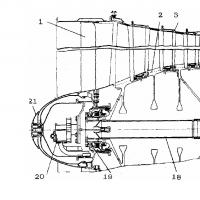 Purpose: basic technical data of the AL 31F engine
Purpose: basic technical data of the AL 31F engine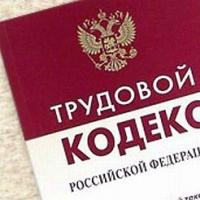 What is severance pay?
What is severance pay? How to number the decisions of the sole founder of an LLC?
How to number the decisions of the sole founder of an LLC?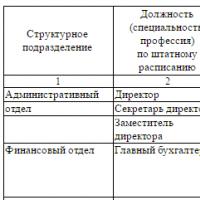 How to fill out a vacation schedule?
How to fill out a vacation schedule? Traffic light concepts, history, purpose Food discounter traffic light
Traffic light concepts, history, purpose Food discounter traffic light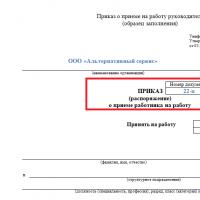 Order for the appointment of the General Director: sample filling, download form
Order for the appointment of the General Director: sample filling, download form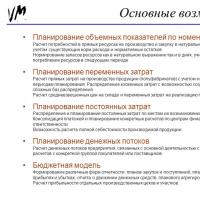 Master of Finance Master of Finance Analysis and Planning
Master of Finance Master of Finance Analysis and Planning